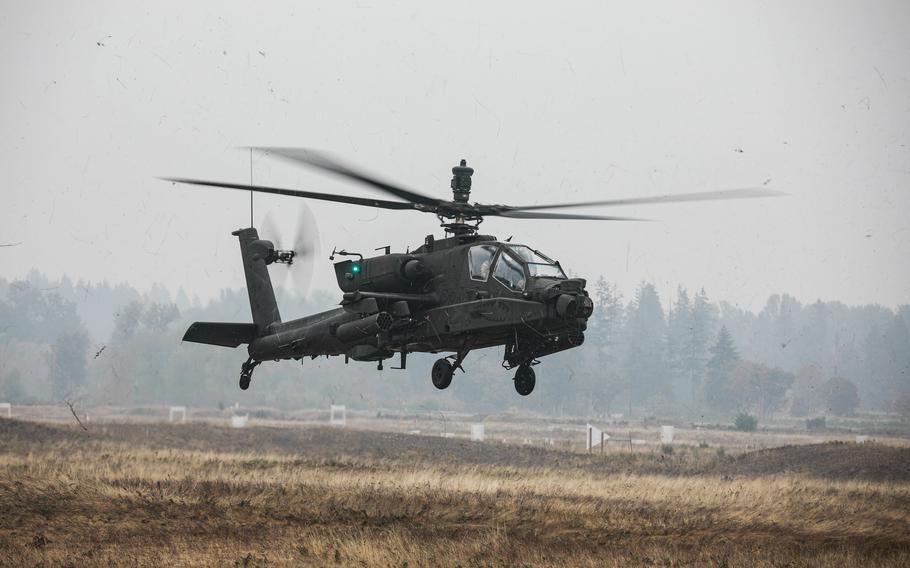
Soldiers assigned to 1-229 Attack Battalion, 16th Combat Aviation Brigade refuel, rearm, and repair AH-64E Apache attack helicopters and other vehicles in October 2022 at the forward arming and refueling point on Joint Base Lewis-McChord, Wash. (Ashunteia’ Smith/U.S. Army)
WASHINGTON — An Army AH-64 Apache helicopter crashed during a training exercise in Washington state over the weekend and investigators are still trying to determine what went wrong, service officials said Tuesday.
The helicopter was carrying two soldiers from the 16th Combat Aviation Brigade from Joint Base Lewis-McChord when it went down near the Yakima Training Center late Saturday, the service said. It was the second Army helicopter to crash in less than three weeks.
The crash took place during training, the base said, and both soldiers were rushed to a hospital. One was released early Sunday, and the other remains in the hospital, an Army statement said. That soldier’s condition was not disclosed.
“Our No. 1 priority at this time is ensuring our pilots receive the medical care they need, while simultaneously caring for their families,” said Army Col. Derek Smith, commander of the 16th Combat Aviation Brigade.
Joint Base Lewis-McChord is about 10 miles southwest of downtown Tacoma and 35 miles southwest of Seattle. The base is home to several Army and Air Force units and the Yakima Training Center — a 327,000-acre complex that has 25 ranges and a “shoot house” that allows service members to train individually or in groups, according to its website.
The base did not identify the two soldiers who were aboard the helicopter when it crashed.
“We are prepared to support these soldiers and their family members with all the resources at our disposal while we conduct a thorough investigation into the cause of this training accident,” Smith said.
The AH-64 Apache is one of the Army’s most widely used attack helicopters since it entered service in the mid-1980s, and Saturday’s crash was the second involving an AH-64 Apache in just 16 days.
Two Apache helicopters collided in midflight and crashed in east-central Alaska on April 27 while returning to Fort Wainwright from a training mission, killing all three aboard. That accident came just weeks after another deadly collision in Kentucky between two Army Black Hawk helicopters that killed nine.
After the deadly crashes, the Army grounded all its helicopters until pilots underwent extra training. Joint Base Lewis-McChord said both pilots involved in Saturday’s Apache crash did complete that supplemental training. An investigation team from the Army Combat Readiness Center at Fort Novosel, Ala., has been dispatched to examine the crash, the base said. The same investigation unit has not yet announced the causes of the crashes in Alaska and Kentucky.
The AH-64 Apache carries a maximum of two people in its tandem cockpit and can fly faster than 170 mph in level flight. The helicopter, produced by Boeing, can carry a chain gun between its landing gear and various missiles for a wide scope of missions. Boeing also makes several variants — labeled as letters “A” through “E” — that feature different capabilities and technologies. The helicopter that crashed in Washington state Saturday was an AH-64E — the newest variant, which has more powerful engines and can operate drones in flight.
The Army has said it intends to keep flying its Apache helicopter fleet until at least 2040. Boeing said there are about 1,300 of the helicopters presently flying in service around the world.
The Army’s use of its Yakima Training Center goes back to the 1940s, and the service calls it “the military's premier training destination in the Pacific Northwest.” The Marine Corps, Air Force, Navy, Coast Guard, Special Operations Command, federal and local law enforcement agencies, and security forces from Canada and Japan have all used the Army training complex.